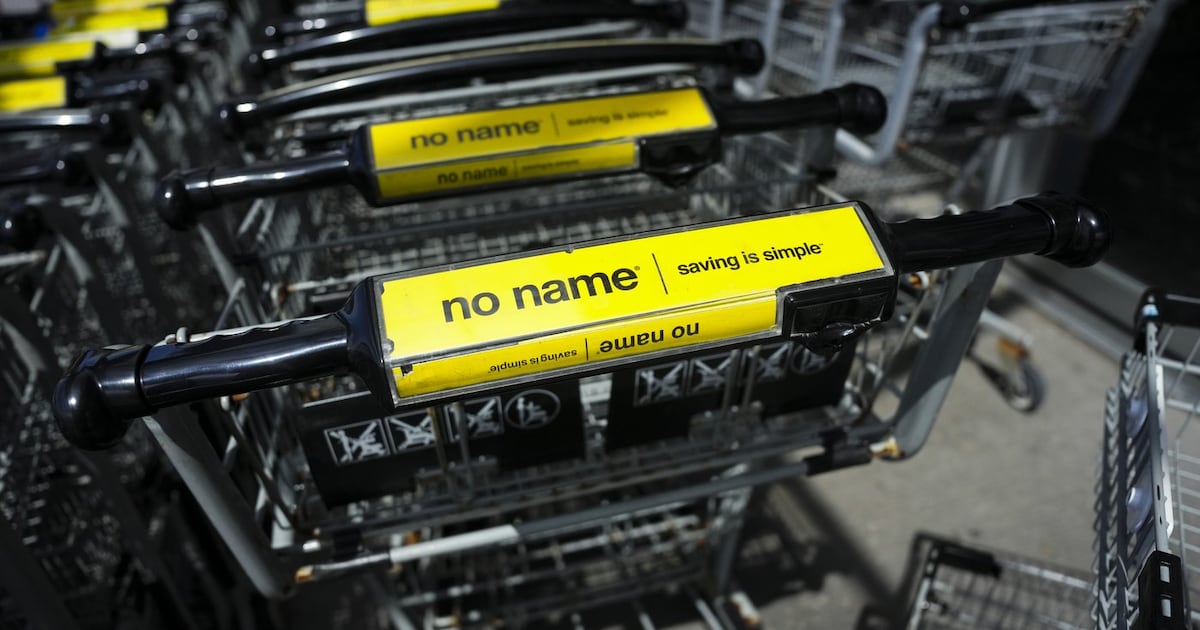TORONTO — Loblaw Cos. Ltd. is closing the second of three Ontario No Name stores it was piloting as a bet on ultra-discount banners, just over a year after they launched.
Loblaw confirmed it will close its No Name store in LaSalle, near Windsor, on Oct. 25, after already shuttering its St. Catharines store in July. A third location in Brockville will remain open, the company said.
The grocer opened the stores last September, which were meant to capitalize on the trend of shoppers flocking to value after years of food inflation ate into budgets. The stores promised to deliver even lower prices than the company’s existing discount banners, such as No Frills.
There was a strong initial response at the LaSalle location, the company said, but the customer base it needed to remain sustainable in the long term failed to materialize.
Loblaw noted the concept was a limited pilot and it is actively applying learnings to reduce operating costs and deliver value to its customers. A new No Frills store near the closing LaSalle No Name store is scheduled to open on Oct. 30, it said.
The No Name stores in the pilot aimed to be less complicated, with lower operating costs. A limited variety of about 1,300 individual products were offered, compared with up to 7,000 products at its smaller-format No Frills locations.
The grocer had the right intentions but missed a beat on execution, said Amar Singh, senior director at the consulting firm Kantar, in an interview.
Singh said several factors, such as a smaller product assortment and no promotions, likely explain why the deep-discount stores didn’t pan out.
“Most Canadians are stressed and they’re time-pressed,” Singh said, and customers don’t want to visit multiple stores to shop for groceries.
Shoppers found a limited selection of frozen items, packaged bakery items, produce and pantry staples, but no refrigerated foods like dairy or fresh meat at the locations.
It was a “very bland assortment, limited assortments, two freezers in the back, and that’s pretty much it,” Singh said. “You can’t even buy milk.”
Loblaw intentionally kept the number of products small to save on building and operations costs. The streamlined selection was also meant to reduce waste.
The lower overhead meant prices at the store were up to 20 per cent cheaper than comparable products at nearby discount stores, including its own No Frills stores, with three-quarters of the products more than 10 per cent cheaper. Two-thirds of the products were priced below $5.
Singh suspects there was some confusion between the No Name stores and Loblaw’s No Frills discount banner.
No Name stores were starting with a new storefront presence in comparison to the well-established No Frills banner, which may have led to confusion among shoppers about what the ultra-discount stores were really offering, he said.
The store also never ran any promotions, which was one of the biggest drawbacks, he said.
Singh said Canadian shoppers “love value hunting” and are “innately value seekers,” but they’re also looking for high quality.
Singh said consumers could find promotional discounts when buying a pack of items elsewhere, such as Costco, while No Name stores didn’t offer further discounts on multi-buys.
Chief executive Per Bank, who joined Loblaw in 2023, seemingly brought the idea with him from his years in the European grocery sector. When energy prices were on the rise a few years ago, he decided to test out this kind of smaller, simplified store at Salling Group with a hard discount banner called Basalt in Denmark, which launched in late 2022.
The concept didn’t pan out there, shutting down after seven months.
The grocery industry as a whole has been under pressure to offer a broader variety of discounted items, as the affordability crisis and economic uncertainty continue to hurt consumers.
Other discount stores, however, are favouring Loblaw’s bottom line. The grocer’s discount stores are doing better than the rest of the portfolio, Bank told analysts during its second quarter earnings call in July.
Earlier this year, Loblaw announced its plan to spend $2.2 billion, opening 80 new grocery and pharmacy stores, about 50 of which are smaller-format discount stores.
Other grocers, including Metro Inc., have been expanding their footprint in discount banners.
—
Ritika Dubey, The Canadian Press
This report by The Canadian Press was first published Oct. 2, 2025.

